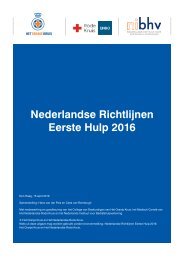Thesis-Anne-Vos-Masters-SBR-and-EU-Law-3
Thesis-Anne-Vos-Masters-SBR-and-EU-Law-3
Thesis-Anne-Vos-Masters-SBR-and-EU-Law-3
Create successful ePaper yourself
Turn your PDF publications into a flip-book with our unique Google optimized e-Paper software.
The second justification concerns the possible conflict with Treaty requirements. Could shale gas<br />
exploitation restrict trade or distort competition? This may be the case if some MS are going to set<br />
strict (environmental) restrictions, which could limit the benefits of shale gas exploitation. Such<br />
restrictions would form barriers to the energy market. Also, the presence of the third justification<br />
ground (clear <strong>EU</strong> benefits in scale or effects) could be argued. The Recommendation establishes a<br />
Union-wide "risk management framework for the exploration <strong>and</strong> extraction of unconventional fossil<br />
fuels, with a view to ensuring that harmonised provisions for the protection of human health <strong>and</strong> the<br />
environment apply across all Member States." In this manner, there can be clear <strong>EU</strong> benefits in<br />
scale <strong>and</strong> effect, namely in the protection of human health <strong>and</strong> the environment throughout the<br />
whole Union. Moreover, the Recommendation can support MS in the exploration <strong>and</strong> production of<br />
shale gas which can also result in clear benefits in scale <strong>and</strong> effect, e.g. the improvement of the<br />
security of energy supply. This latter justification is also referred to by the Commission. It points to<br />
a study of the Commission in 2013 (on the economic benefits from the completion of the internal<br />
energy market) where it appeared that "addressing security of supply within national boundaries<br />
only results in welfare losses". 413 Moreover, the Commission states that negative occurrences in<br />
one MS will badly influence other MS, e.g. with regard to the public perception. Therefore, action<br />
by the Commission could even lead to better effects with regard to better legitimacy <strong>and</strong><br />
acceptance of the public. Also, different approaches <strong>and</strong> (inconsistent) legal frameworks per MS<br />
would not enhance investors to invest in the <strong>EU</strong>. Last, different frameworks would be very<br />
problematic <strong>and</strong> confusing when a shale gas project would involve more MS. As the Commission<br />
concludes<br />
An <strong>EU</strong>-wide approach that would tackle the current ambiguities <strong>and</strong> gaps in the <strong>EU</strong> legal framework<br />
would therefore make the economic case of shale gas clearer. It would also contribute to developing<br />
credible knowledge-based risk response strategies, thus better responding to public concerns <strong>and</strong><br />
public authorities' questions about the applicability of the <strong>EU</strong> environmental acquis. 414<br />
Furthermore, as mentioned in Chapter 5, it is not easy to assess when action can better be<br />
achieved at Union level or what should be understood as 'better' (cheaper, closer to the citizen,<br />
more environmentally friendly?). With regard to the shale gas discussion it would e.g. be the case<br />
that Pol<strong>and</strong> deems non-binding rules more than enough <strong>and</strong> underst<strong>and</strong>s better as cheaper (since<br />
she is already carrying out drillings), while e.g. Germany or France would probably support more<br />
strict rules <strong>and</strong> appreciate better as more environmentally friendly (since they have adopted<br />
moratoria <strong>and</strong> legal bans). Interestingly enough, Romania has adopted a legal ban. This contrasts<br />
with the statement of Krämer ("poverty is the biggest environmental pollutant"), since Romania is<br />
one of the poorest MS in the Union <strong>and</strong> dependent on (expensive) gas from Russia. All in all, this<br />
discussion is very political. In the Netherl<strong>and</strong>s, the government has reacted positively on the<br />
adoption of the recommendation. The government refers to the fact that the Union has already<br />
adopted general <strong>EU</strong> legislation <strong>and</strong> specific legislation on the environment, which is applicable to<br />
shale gas exploitation. According to the government the <strong>EU</strong> action is justified on two grounds. First,<br />
it was necessary to provide clarity on <strong>EU</strong> minimum principles for shale gas activities in order to<br />
facilitate a proper functioning of the internal market. Second, the government states that there are<br />
transnational effects that justify <strong>EU</strong> action. 415 It thus joins the first <strong>and</strong> second justification grounds.<br />
It is however regrettable that the Dutch government does not refer here to the extra conditions of<br />
Article 194(2) TF<strong>EU</strong>, which the Recommendation also has to comply with. These extra conditions<br />
will now be discussed.<br />
Hence, the general application of the subsidiarity principle, ex. Article 5(3) T<strong>EU</strong>, does not seem<br />
breached. However, it still needs to be assessed whether the <strong>EU</strong> measure might infringe a more<br />
413<br />
Commission Staff Working Document Impact Assessment (2014), part 1/4, p. 39.<br />
414<br />
Commission Staff Working Document Impact Assessment (2014), part 1/4, pp. 39-40.<br />
415<br />
Kamerstukken II 2013/14, 22 112, nr. 1858, p. 4.<br />
82



